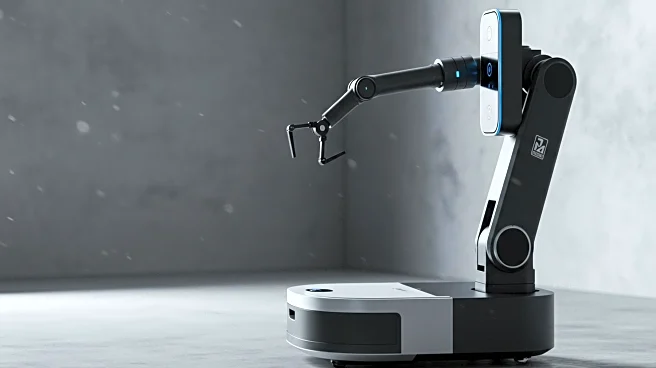What's Happening?
Roborock, a leading company in the robotic vacuum industry, is planning to introduce a more affordable version of its robot vacuum equipped with a mechanical arm. Currently, the Roborock Saros Z70, which features this technology, is priced at $2,600, making it inaccessible for many consumers. However, Roborock's president, Quan Gang, has indicated that within five years, the company aims to release a mass-market version priced at just a few hundred dollars. This move is part of Roborock's strategy to expand beyond the premium segment and increase the adoption of robotic vacuums. The Saros Z70 has been praised for its capabilities, although it has faced criticism for its high price and limited functionality in sorting items.
Why It's Important?
The introduction of a more affordable robot vacuum with an arm could significantly impact the U.S. market, where the penetration rate for robot vacuums is currently only 22%. By lowering the price, Roborock could tap into a vast number of potential consumers who have yet to adopt this technology. This development could also drive competition in the industry, prompting other companies to innovate and reduce prices. Additionally, the advancement in AI-powered robotic arms could lead to broader applications beyond household cleaning, potentially influencing sectors such as logistics and manufacturing.
What's Next?
Roborock's plan to reduce the price of its robotic vacuums will likely involve overcoming challenges related to software and data improvements, as well as addressing tariff issues that have previously increased costs. As the company works on enhancing the functionality of the robotic arm, it may also explore solutions for additional challenges, such as enabling the robots to navigate stairs. The success of these initiatives could lead to wider adoption and acceptance of robotic vacuums with advanced features in the consumer market.
Beyond the Headlines
The potential for robotic vacuums with arms to become more affordable raises questions about the future of household automation and the role of AI in everyday life. As these technologies become more accessible, there may be ethical considerations regarding job displacement and privacy. Furthermore, the development of more sophisticated robotic capabilities could lead to shifts in consumer expectations and lifestyle changes, as people increasingly rely on automation for routine tasks.









